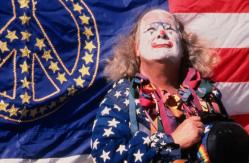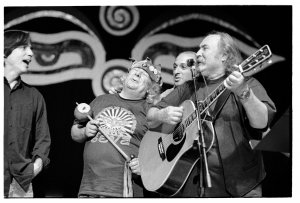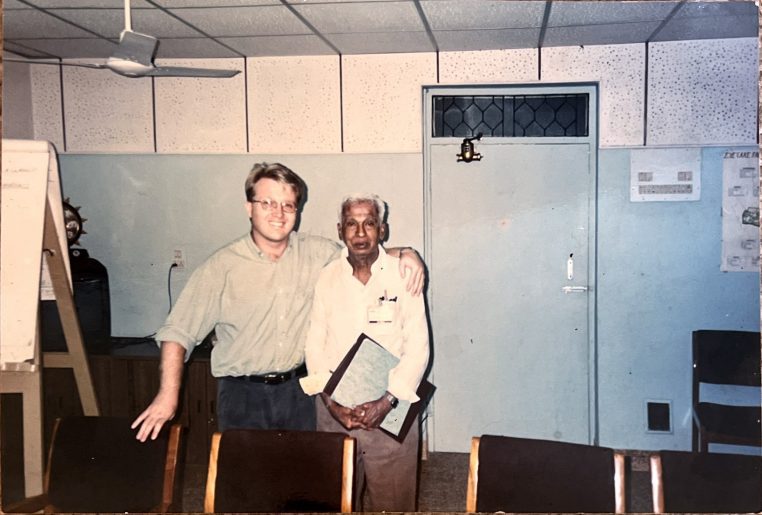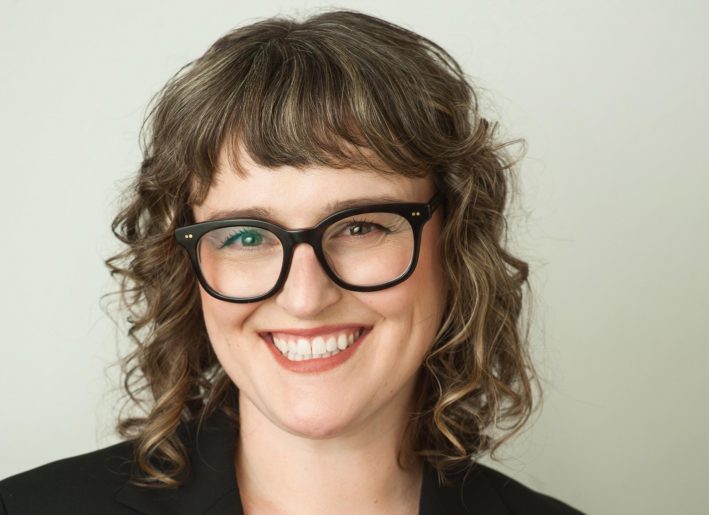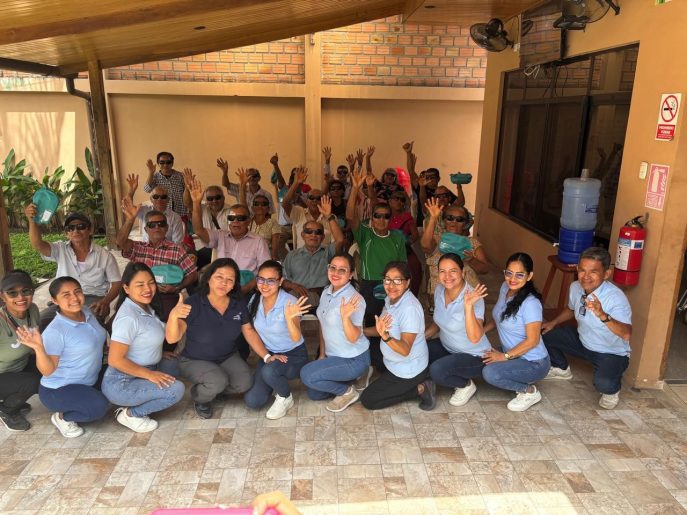Interview By Dale Rangzen on December 15, 2011
DR: Hey Wavy! Thanks for taking my call. How are you?
Wavy: Semi-spectacular!
DR: That’s the best we can hope for, isn’t it? My kids have been watching Saint Misbehavin’ at night before bed. I put it on the other day and I wasn’t sure what they’d think and I kept saying “I can turn it off if you like,” but they loved it. They’ve watched it lots of times and my oldest daughter wants to work at your Camp Winnarainbow when she’s older.
Wavy: Ahhh, no kidding. You know that when people ask me what my greatest legacy is, I always have to say the kids who have come out of Winnarainbow. I’ve been doing the camps for 35 years now.
DR: How did that start?
Wavy: It was serendipity. You know that coincidence is a miracle that God doesn’t take credit for. My wife asked me to babysit our son – who was seven years old at that time – while she attended a sufi camp – that being her spiritual lineage. It was out in the Mendocino among the redwoods. I had noticed that many parents there had brought their kids, and that sometimes meant that they couldn’t attend meditations. So, I said, “Give me the kids and I’ll keep them busy.” A few other parents – one who was a juggler, another who was a film director – helped me keep the kids involved. It started to take off and we ran our first camp at the Hermitage at the Lama Foundation. That’s of course the place where Ram Dass wrote “Be Here Now”, which was the spiritual Bible of the sixties. We discovered that we really enjoyed doing it and the kids seemed to enjoy us. We moved the whole scheme to another campsite a few miles away and found that the kids really enjoyed their own personal liberation and it made it easier for the parents to attend their meditations. So, it’s evolved to the point where we have 700 kids every summer at camp. We take 150 at a time for seven weeks over the summer. We have a week of camp for adults now too and it’s grown to the point where people come from all over the world. Last year, after the nuclear accident in Japan, we had a whole group fly from over there seeking higher ground at Winnarainbow.
DR: It’s become a truly legendary camp. Both of my kids would do anything to attend.
Wavy: Well, in the early days we did camps at the Lama Foundation and we did one on the east coast at the Omega Foundation. Eventually, the Hog Farm found some permanent land.
DR: How did you know when you’d found the right place?
Wavy: I went into this oak grove and in my imagination I immediately envisioned a circle of teepees. We found a way to purchase the land and I moved onto it with a part of my extended family. I live in Berkeley during the rest of the year, but for the camp season I live five miles outside of Laytonville. It’s a pretty little town, but if you blink, you’ll miss it.
DR: A lot of things, the best things in life are like that. It gets more mysterious as it goes along, doesn’t it?
Wavy: It is all a mystery to me – the adventure of life. My adventure started out when my parents were living in Princeton, New Jersey. I remember, one of my earliest memories, was when my father was away in Venezuela working as an architect. I was five years old and my mother had put me out in the yard for my morning airing when this guy with a shock of white hair comes walking by. He asked my mother if he could walk me around the block; now in those days, that was not such a shocking proposition. The thing I absolutely remember from that walk was how funny that old guy smelled. Do you know who he was?
DR: No idea.
Wavy: Albert Einstein!
DR: No… *beep*.
Wavy: Absolutely true. Now, everybody who I’ve told this to has asked me what we talked about and I have no idea. The only thing I remember is that he smelled like nobody else I’d ever met – or met since. Now, my nose is open and I’m waiting to finally get the chance to say to somebody “You smell just like Albert Einstein!”
DR: Now, that’s a one liner seventy years in the making!
Wavy: Indeed! Still waiting to use it! Well, at seventeen and a half years of age, my parents divorced and I had no idea of how I’d make it to college without any support. A high school advisor told me that the GI bill for the Korean war was going to be cut off in ten days, so it was a good time to volunteer for the army and have my college paid for.
DR: Wavy, it’s impossible to picture you in the army.
Wavy: Yeah, but I volunteered for the draft in the army. Hard to believe, but true. Mostly, I painted murals and decorated day rooms for the military. Here’s a funny story. So, usually, I cleaned my paint brush on my uniform which rapidly turned every colour except for khaki. One day, I was on the parade ground at Fort Dix and a general drove by in his jeep. Suddenly, it screamed to a halt and the general asked me, “What army are you in, soldier!” I answered in a tiny voice, “Yours sir!” He looked me up and down and drove off. I think I eventually ended up decorating his basement.
DR: What happened after you got out of the army?
Wavy: After the service, I went to Boston University and attended the amazing theatre school there. We were located on St. Bethel Street in a big ancient gargoyle-covered building. A lot of the greatest directors in America came by there. My main occupation was crewing in the costumes department. That lasted for a while, but a lot of the teachers in the theatre department were there because of the McCarthy era blackballs. When that passed, they all quit and went back to New York to practice their craft. They took me with them. While I was there I read about jazz and poetry readings in San Francisco and the whole scene that was growing there. I thought I could do that and got my first gig in the basement of a bar in Boston called Pebble in the Rock. After a while, my partner and I hitched into Maine and started a coffee house there. A little later on, that ended and I went to New York again to study at the Neighbourhood Playhouse and I started to do readings at the coffee houses in Greenwich Village. I ended up as the poetry and entertainment director at The Gaslight, which was the premiere venue for the scene in those days.
DR: So many people got their start there.
Wavy: People would line up around the block to look at the beatniks they had heard frequented the place. After each reading, people would throw money into a hat. It was great at first, but it got tedious after a couple of years. The poems weren’t coming out of me quickly, so in between poems I started to talk a lot about the weird day I’d had. Then one night, a guy came in and said skip the poems and talk about your weird day and you’ll be a hit. So, I was sent around country doing my stand-up thing and I opened for John Coltrane; The lonious Monk; Peter, Paul and Mary. Big acts at the time. When I was at The Gaslight, I was organizing hootenannies and this young guy named Bob Dylan walked in.
DR: Did you realize he had something special right away?
Wavy: Oh yeah. He came in and asked, “Do you mind if I play tonight?” and you know, I was so accustomed to the ‘moon, june, spoon,’ rhyme schemes of the folk scene and he came up with some very fresh images. “Hard rain” was written on my typewriter. But, I remember first hearing “Visions of Joanna” with its “ghosts of electricity” images and it was like nothing we’d ever heard before.
DR: There’s a scene in the film where we’re told that you told your wife to be – Jahanara – that you didn’t think you’d live for very long. Are you surprised that you’re still live and kicking?
Wavy: Oh yeah, I didn’t think I’d make forty. Those were turbulent times. I was tap dancing on the edge all of the time. I was certainly ready to do anything to stop the genocide in Southeast Asia. There were times I’d go to a protest and they were taking me out of the window of the bus in a full body cast. Even like that, there’d be cops blowing whistles and encircling me and like I was being given a penalty in a hockey game. It was a truly raucous situation I lived in for years.
DR: Truly! It’s quite a transition from a poet and a stand up raconteur to a political agitator and finally a clown. How did all of that come about?
Wavy: I discovered that when I was dressed as a clown, policemen wouldn’t hit me. So, when I went to the Republican convention in Kansas in 1976, I bought every red clown nose in the States and put them on the resistors. Nobody got hurt. One of my favourite memories was when – in the early days of the Hog Farm – we took a baby pig on the bus to remind us of our humble beginnings. We decided to run that pig for president in 1968, declaring it the first black and white candidate!
DR: That’s hilarious. I wanted to ask you this. I was just down at the Furthur concerts in Eugene. It had been a few years since I’d gone into deep hippie territory and I was amazed at the power and vibrancy of the scene. Why do you think this culture has had such lasting power?
Wavy: As for Furthur, there is a love affair between the band and the audience, that is so palpable you can almost see it. The band creates a groove and tosses it out, the audience wash themselves in it, and this great invisible ball of love goes back and forth. It’s like Ravi Shankar says: music elevates people beyond the slings and arrows of outrageous day-to- day-life and lifts them to a spiritual place.
DR: What kind of hippie legacy have the hippies left?
Wavy: You can see it in the creative imagination of the Occupy movement. It’s Hippie know-how at work. We know how to go into an area and exist. We know how to maintain life support in difficult situations. I see the legacy in the Burning Man in the desert. I went there and it absolutely blew my mind. I’ve been going to Rainbow gatherings for many years. It’s where hippies go to reconnect with each other, share stories and crafts. We’re talking 8 to 9000 people in pristine forests.
Hippies are all over the place. With Burning man, it’s even more elaborate. They’re committed to bringing out everything, every coffee grain they bring in. It all has to be carried out. Going to Burning Man was like somebody plugged in a Rainbow gathering. It was like flying out of Merlin and into Flesh Gordon.
DR: Enough said. One of the most fascinating aspects of the new movie about you is how it portrays your forty-year-plus experiment in communal living. Can we talk about how the Hog Farm – which has got to be one of the oldest functioning communes in North America – and how it started?
Wavy: It was serendipitous. After a bunch of stuff went on, Mrs. Gravy and I decided to move out of LA into the country and we moved to a little sleepy bucolic – oh God so beautiful town in the hinterlands – but only forty five minutes from Hollywood by the freeway in Semlin, California. We had this little cabin.
DR: How cool is that!
Wavy: So cool as to be frozen solid and glacial. We got this call from the Pranksters that Life magazine was going to shoot a cover on psychedelica and they wished for us to join them in a cover shot with the Pranksters and the Grateful Dead. We were honoured to drive into Hollywood to do this and while we were all posing for the cover, Ken Babbs stole the bus and took off to join Kesey who was on the lam in Mexico. So, in our little one bedroom cabin my wife and I ended up with thirty-five house guests. It was very chummy. We had a garage and a chicken coop where, needless to say, people were living. The landlord came by and said you can’t have that many people living in a one bedroom cabin and you’re evicted. Once again – in the land of kitchen synchronicity about an hour and a half later a neighbor drove by who said “Old Sol up on the mountain had a stroke and he needs someone to slop up them hogs!” So, we were given a mountain top with a house on it rent-free if we would tend these fifty hogs the size of a Davenport steer! They were enormous. We would feed them slop every day at sunset, but because we heard that about forty eight farmers a year were devoured by their livestock we always fed them in groups of two. On Saturday evenings, we would attend the mega music concerts at the Shrine Auditorium in Los Angeles which was the premiere venue for bands like the Dead and the Airplane, the Rolling Stones and Cream and all of those bands. We had a travelling light show called The Single Winged Turquoise Bird and I got to climb on a microphone and do energy games with the audience at band breaks. Then, on Sundays, pretty much all of Southern California was invited to join us at our mountaintop for free celebrations. Each Sunday was a different theme. I remember kite Sunday during which there was no wind, which was kind of a bummer. Then, when the sun went down, the thermal energy shifted and then, well, you couldn’t tell if someone was flying a kite or whether they were just putting you on! It was really cool. We had a Hog Farm country fair with a kissing booth, a contest to see who could stay under water the longest, a pie eating contest and all that kind of stuff. Tiny Tim came up once and we built a theatre for him out of nothing – with benches and a stage. You know, if you get a few hundred people moving rocks with shovels and you can do just about anything.
DR: You’ve been through lots of incarnations with the Hog Farm over the last four decades or so. Are some of the original members still there? How has it all evolved?
Wavy: Yes, we have some of the original people. The amazing thing is that we’re still together.
DR: Was it a long trip to actually settle there? I know you were on the road for years.
Wavy: Yes, we were. One Christmas, a couple of the people who were mechanics bought us a white school bus to drive around. Shortly after that, we secured a gig working for Columbia Pictures in a film called Skidoo which was Otto Preminger’s …movie starring Groucho Marx as God and Jackie Gleason and Carol Channing. It’s available now on DVD and it’s pretty amazing if you think about it.
DR: I have a hard time imagining what it would be like living on a bus for seven years. Lots of people start endeavors like this, but they don’t stick to it like you did and still do. Are you someone who doesn’t need much privacy or personal space?
Wavy: After the bus trial, everything else seemed enormous. On the bus, we had these benches that would open up to double beds at night. Inside the benches were our footlockers where we had our personal space. We had overhead space also, so there was a pretty good amount of storage. Live on a sailboat and you’ll have a little less room than you had.
DR: I’m thinking of the film where some of the adult children who grew up at Hog Farm talk about have 25 mothers and fathers. That’s an amazing social experiment that you pioneered. I’m not sure if you realize that or if it’s sunk in. You live differently than most other people.
Wavy: Hold on now! First of all, if you look at a book called Intentional Communities, you’ll discover that there are more people living on communes now than there ever were in the sixties. A lot of people come together because they want a nice big house and stuff and they can’t afford it on their own. So, they get three or four other families together and they rent a big house. It all seems to come together around the refrigerator and the kitchen. And, if they can do group meals and take turns cooking, there’s a lot of blessings there. That seems to be the way it gets started. Then, we all had different jobs and we do again. There was a while before we hit the road that we all had the same job and then traveling on the road and doing the shows was amazingly unifying.
DR: I bet.
Wavy: In some respects, I really miss that but I don’t have the physical wherewithal that I could hold up in that kind of vector. I think you need to be in your twenties or thirties to pull that off.
DR: I’m out of that range, too. I used to be able to fall asleep anywhere – the baggage department of an Indian train – but those days seem far behind now. Lots more aches and pains.
Wavy: There’s no telling what’s going to happen. I could certainly exist nicely on a big rock and roll bus with a lot of people lugging my shit around if all I had to do is sit down in front of a microphone. That may still happen. Michelle (Esrick – the film’s director) wants to do that. Who knows? We’ll take the film and show it to folks from college to college and that sounds like a very interesting way to activate some young people.
DR: Far out.
Wavy: That’s in the fantasy vector at this moment.
DR: To me, that’s part of the great legacy created by this film. It has this model of living in the Hog Farm and it’s captured so beautifully. It’s there for young people to see.
Wavy: It’s also very much in both of my books. Like I say, there’s an enormous amount of communities out there and some of them are looking for more recruits. Some teams need to get together and try it. Everybody has a circle of friends.
DR: I have lived communally in a cabin on the mountains outside Vancouver, but I am still attracted to privacy and personal space.
Wavy: Well, at the ranch dwelling scene, some places are more condensed than others. Mr. and Mrs. Gravy for the first time ever have a two room structure – one on top of the other – and the bedroom is upstairs. Downstairs, is a tiny kitchen. We have a cookhouse on the property where most meals are held. We do Thanksgiving at the ranch and we do Christmas at the Bay area and some form of New Year’s. Though we don’t do the Grateful Dead New Year’s anymore. I’ve been working a lot with the Animal Liberation Orchestra for New Year’s. I’m happy to make a few extra bucks because mostly I do Camp Winnarainbow as my full time thing. There is an organic farm run by an Irish woman named Irene who does incredible stuff and she just put in a full orchard. Also, on the property is a business called In Tents and they make fireproof teepees and awnings. These are made by a woman who lives here named Georgie Chase.
DR: In Tents!
Wavy: Yeah, I made up that name. I’ve become very good at the short dash. Also, a fellow named Evan has an environmental business on the property and he talks about this amazing vision we had called Earth People’s Park that involves buying back the earth and giving it away. We actually purchased 500 acres of land in Northern Vermont and then the Feds after twenty years tried to seize it and we ended up having to turn it into a state park. This idea is what I call the last left hand turn in America. If you set up an office and you get people to mail in five or ten dollars a month and then you can take the money and buy back more land across the country and then leave it. These places would be way stations that would belong to everybody. In an altered state, I got an incredible buzz around that idea. It’s off the charts. That’s a spark that more young people are going to have to take up and run with. So, there’s a lot to do.
DR: No kidding!
Wavy: These things along with the Seva Foundation occupy most of my life. I organize those concerts and put them together for them. The biggest one we did was actually in Toronto, Canada. It featured the Grateful Dead and The Band. It was an absolutely memorable night and we raised a quarter of a million dollars for our work with Seva curing blindness in India and Nepal.
DR: I remember some great Seva concerts in Vancouver with Bob Weir, Rick Danko and Jorma Kaukokken amongst others.
Wavy: Yes, we’re planning another. I’m in deep conversation with Elvis Costello about it, but his dad has gotten very sick. Bruce Cockburn and I are also talking about it. He played at our ranch and is now living in the Bay area. We do some wonderful shows on the property for about six or seven thousand people. The one to catch is called The Kate Wolf Memorial Festival, which we’ve done for many years. It’s pretty much an acoustic show and it’s as sweet and swell as anything you can imagine. That takes place during the kid’s camp so I zoom back and forth. We also broadcast the show in the immediate area, so everybody working on the farthest peripheries of the show are able to hear the main stage from the place they’re volunteering. If they ever do another Woodstock, I’ll do that. I’m there for Michael (Lang – the promoter of the Woodstock concerts) I’ve been to all three Woodstocks. I tell people that the first one made me famous and the other ones got me paid.
DR: Was it at the first Woodstock that you realized hippies could create an alternate way of doing things that could succeed or rival what was done outside in the ‘straight’ world?
Wavy: That’s why they got us to Woodstock. We’d been driving around the country and holding these open celebrations and they thought that we could be useful. We were startled when we came out of our chartered aircraft from New Mexico and we discovered that they’d made us security. That was a jaw dropper. We didn’t realize the impact we had until we were halfway across the Southwest going into Texas for the Texas Pop Festival. It began to sink in – the impact of our association with the Woodstock Festival. My God! We’re still getting feedback from that.
DR: Well, it all could have turned out so differently. There was such a hysterical element surrounding the culture at that point.
Wavy: So, I imagine if I can make it until 2019, it’s going to be interesting. They’ll really pull out all of the stops for the 50th anniversary celebration of Woodstock. It was crazy when it was thirty years old; it’ll be strictly nuts if they do a fiftieth. Eternity now! That’s my slogan! Eternity now! Here I go!
DR: Happy trails Wavy!
